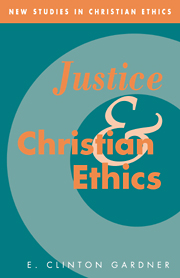Book contents
- Frontmatter
- Contents
- General editor's preface
- Acknowledgments
- 1 Introduction
- 2 The classical tradition of virtue
- 3 The righteousness of God and human justice
- 4 Justice in the Puritan covenantal tradition
- 5 John Locke: justice and the social compact
- 6 The American Republic – a case study: civic virtue and the public good
- 7 Covenant, justice, and law
- Notes
- Select bibliography
- Index
General editor's preface
Published online by Cambridge University Press: 31 March 2010
- Frontmatter
- Contents
- General editor's preface
- Acknowledgments
- 1 Introduction
- 2 The classical tradition of virtue
- 3 The righteousness of God and human justice
- 4 Justice in the Puritan covenantal tradition
- 5 John Locke: justice and the social compact
- 6 The American Republic – a case study: civic virtue and the public good
- 7 Covenant, justice, and law
- Notes
- Select bibliography
- Index
Summary
This book is the seventh in the series New Studies in Christian Ethics. As I had hoped, a distinctive shape is beginning to emerge in the series. Not only are contributors well-versed in one of the humanities, science or social science disciplines, they are also prepared to challenge some of the secularist assumptions that often underpin them in the modern university.
Kieran Cronin's Rights and Christian Ethics, the first book in the series, saw considerable areas of overlap between Christians and secularists in the debate about “rights.” However he concluded that Christians (and indeed many others with religious faith) do have deeper “justifying reasons for acting morally” than secularists, precisely because moral behavior for Christians is a part of their relationship to God.
James Mackey's Power and Christian Ethics also offered a theological challenge to much secular thought. He argued that, in a world that frequently equates power with force, religious communities (despite their many failures) can have real significance. At best such communities offer a “radical and encompassing sense of life as grace” which “enlightens and empowers people to imagine and create an ever better life, and also to overcome the forces of destruction which one could otherwise onlyjoin and increase, but never beat.”
Ian Markham's Plurality and Christian Ethics also offered a distinctive theological challenge. In arguing for a position of what he terms “constructive plurality,” he maintained that secularism as a basis for rational dialogue in the modern world is surprisingly weak.
- Type
- Chapter
- Information
- Justice and Christian Ethics , pp. xi - xiiPublisher: Cambridge University PressPrint publication year: 1995

